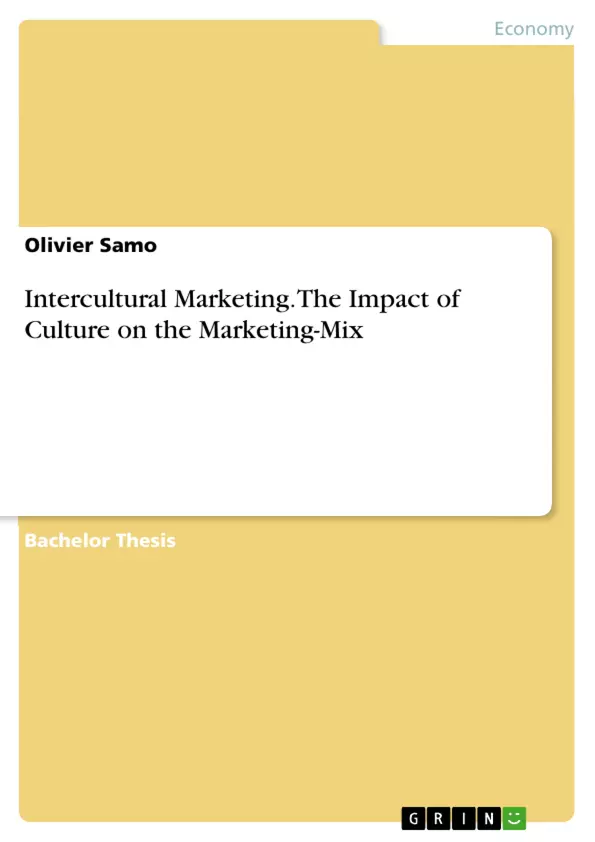The objective of this presented bachelor thesis is to demonstrate how culture affects international marketing activities, thus portray the marketing intercultural branch. In other words, the reader will gain an idea of the importance of culture in the strategic marketing planning.
From a marketing point of view, it is recognizable that worldwide interdependence of economies has partly created homogeneity of business operations, but the world is still comprised of cultural differences and specificity and various consumer behaviors and needs. Bearing this fact in mind, enterprises integrate culture more and more into international marketing activities, especially when doing business in an environment full of cultural diversity.
The question of a strategic choice is raised at this point. Active international corporations have to decide whether to standardize or to adapt to marketing-mix activities.
This leads to the following questions: which factors determine businesses choice for a differentiated or a standardized strategy in marketing mix activities? To what extent can companies standardize goods and services? Is standardization relevant for all marketing mix activities and for all foreign target markets? Is it a necessary for the active international firm to adapt their activities to each national culture? How important is the impact of culture on marketing-mix? The presented paper will provide some preliminary answers to these questions with an emphasis on marketing-mix elements and will investigate whether and to what extent culture should be considered as a strategic key success factor.
Table of Contents
- Introduction
- Definition of the problem
- Objectives of the Thesis
- Methodology
- International Marketing
- Globalization of the economy
- Definition of International Marketing
- Orientation Systems
- Intercultural Marketing
- Terminology Delimitation
- Orientation Systems
- Standardization vs. Differentiation
- Market Segmentation
- Culture
- Common Understanding of the term Culture
- Theoretical Approaches dealing with Culture
- Cultural Dimensions according to Hofstede
- Cultural Dimensions according to Hall
- Adjustment of the Marketing-Mix to the Culture
- Product Policy
- The nature of Intercultural Product Strategies
- Standardized vs. differentiated Products
- Culture-free and culture-bound Products
- Product Attributes
- Program Policy
- Branding Policy
- Packaging
- Communication Policy
- The Nature of Intercultural promotional Decisions
- Intercultural Advertising Decisions
- Advertising Objectives
- Advertising Message
- Advertising Media
- Pricing policy
- The Nature of Intercultural Pricing Decisions
- Cultural Influences on Pricing
- The Role of Money
- Price as Quality Indicator
- Price Acceptance Level
- Distribution Policy
- The Nature of Intercultural Distribution Decisions
- Intercultural Logistical Decisions
- Internationalization and Standardization
- The Selection of the Distribution Channel
- The significance of culture in international marketing
- Cultural dimensions and their influence on consumer behavior
- The challenges and opportunities of adapting the marketing mix to different cultural contexts
- The importance of intercultural sensitivity and understanding for successful international marketing
- Various strategies for adapting product, communication, pricing, and distribution policies to different cultures
Objectives and Key Themes
This thesis aims to explore the impact of culture on the marketing mix, specifically in an international context. It analyzes how cultural differences influence the adaptation and implementation of marketing strategies across various markets.
Chapter Summaries
The introduction sets the stage for the thesis, defining the problem, outlining the objectives, and explaining the methodology. Chapter 2 provides a comprehensive overview of international marketing, exploring the globalization of the economy, defining international marketing, and examining orientation systems used in international business. Chapter 3 focuses on intercultural marketing, delving into terminology, orientation systems, and exploring the critical debate between standardization and differentiation in marketing strategies. Chapter 4 delves into the concept of culture, offering a common understanding of the term and analyzing theoretical approaches to culture, particularly through the work of Hofstede and Hall. The thesis continues by examining the adjustment of the marketing mix to the culture. Chapter 5 explores various aspects of product policy, communication policy, pricing policy, and distribution policy, highlighting the specific challenges and opportunities of each area in the context of cultural differences. This chapter provides insights into the nature of intercultural decisions, exploring strategies for adapting different marketing elements to specific cultural environments.
Keywords
Intercultural marketing, marketing mix, culture, cultural dimensions, globalization, standardization, differentiation, product policy, communication policy, pricing policy, distribution policy, Hofstede, Hall, international business.
- Quote paper
- Olivier Samo (Author), 2014, Intercultural Marketing. The Impact of Culture on the Marketing-Mix, Munich, GRIN Verlag, https://www.grin.com/document/307913



